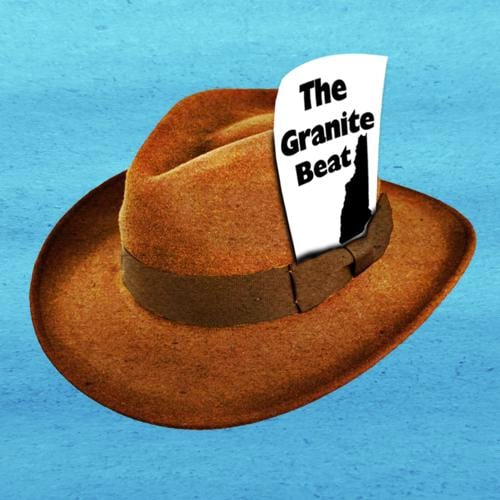Steven Porter, one of the two reporters given the historic assignment of launching a New Hampshire Bureau for the Boston Globe at the beginning of this year, comes on to share his story being in journalism and his insight on the changes within technology and social media.
This article has been edited lightly for length and clarity.
Adam Drapcho: Would you please tell us when and how you first became interested in journalism, and how you're able to find a way into the career?
Steven Porter: Absolutely. So I have to laugh a little bit because I, in undergrad, did not originally eye journalism as my career path. I was a media communication major. So I did a lot more with video production and television and that sort of thing, not TV news, but television. And I was about halfway through that program when I realized that I had some time in my schedule before I was going to graduate. And I said, "OK, what is the nearest thing that I can add on?" and I added on a journalism minor. And I realized that I am much more interested in nonfiction storytelling as opposed to fiction storytelling. So that was kind of my entry point, undergrad, realizing that I had a convenient opportunity there. So I took it, and that was my starting point.
Adam Drapcho: Could you tell me how the Granite Memo came about? Why did you embark on that? And how do you think it helped your career?
Steven Porter: Yeah, so Granite Memo is the newsletter and website that I launched, focused exclusively on New Hampshire politics. So kind of backing up a little bit, I spent a few years after grad school working for a business-to-business publication and health care, which was a really great experience that gave me an opportunity to gain some skills that I maybe would not have gotten, working for newspapers. But after a few years of that I said, "I'm really itching to get back into the type of journalism that I started out in," which is, the stuff that really matters for the day-to-day not just for a niche audience, but for kind of the general public. And so I was at this publication, I was living in Portsmouth commuting to Middleton, Massachusetts, and it was 2019. And the presidential primary was unfolding in my backyard. And I said, "Man, I really want a piece of that action." So I said, "I'm going to launch this publication as an excuse to show up at campaign events and cover them, and I'm going to pick up freelance reporting assignments." So in 2019, I was really fiddling around with this prototype of this newsletter, started out on Substack. And then, after the 2020 presidential cycle wrapped up, I had really only fiddled with it. And so I kept my day job throughout that whole process. But fast forward to fall of last year, I was at USA Today, working remotely, still living in the Seacoast of New Hampshire. And I said, "Alright, if I'm going to cover this, if I'm going to really get in position for the 2024 primary, not to mention the 2022 midterms, I really need to go full bore on Granite Memo."
So I kind of dredged it up, I moved it over to from Substack over to this publication, or this platform, rather, called Ghost. And I said, "OK, I'm gonna do this full time." I made some kind of strategic decisions financially in order to make that feasible, just on a personal level. And then I left my job last fall at USA Today and said, "OK, I'm going to report on New Hampshire full time and really get behind this Granite Memo product." And I think that there are really two motivations that were behind that move. One, I wanted to cover New Hampshire, like I really am. I've been here about six years looking to put down roots, have been putting down roots. And then the other is I wanted to build something. So those two motivations were really central to why I was launching Granite Memo. And because of that, I got the attention of the Globe. So I was only a couple of months into doing that full time when I got a call from the editor of the Globe at the time, who said "Hey, we're looking to launch a newsletter in New Hampshire about New Hampshire, you're already there. You're already doing that. How would you like to do that sort of thing for us?" And I said "Well, done." This is kind of the best case scenario. I get to cover my backyard and build something in the process while really putting my journalistic skills to use." So I was just floored that they would reach out and offer this opportunity. And that, as you mentioned, started at the beginning of 2023.
Adam Drapcho: So what was it like then to create something that had no sort of brand identity in the Granite Memo, to go right from that into something that probably has the strongest brand identity in the region other than the Boston Globe?
Steven Porter: I think that people have returned my calls now which is nice. Because every time I'd interviewed people when I was doing Granite Memo, it was like, "Hey, I'm Steven Porter with Granite Memo, which is a publication that I have started because of XY," so it was always introducing myself at every stage. Whereas now it's like, "Hey, I'm Steven Porter with the Boston Globe. But I'm in New Hampshire full time. I'm not in Massachusetts." That's what I always tell them. Because they always think, "Well, why did you drive up from Massachusetts?" And it's a "No, no, no, I'm in New Hampshire full time." So I think that, absolutely, that was a significant transition and I think that it is one, people returned my calls. And two, there's also on the audience side of the equation, there's also kind of, honestly, higher expectations, like there's this expectation of each individual story, really carrying a level of significance, that that's different from what when I was doing my own thing, I could do a tiny little story that's 300 words and just because this is interesting. Whereas now, if I do that same sort of story, people read it as being potentially much more significant in a way like they're kind of like, what's the point? Why are you covering this? And I said, "Oh, because it's interesting." So there's kind of a component there where I have to anticipate how the audience receives things differently, because it's under the Globe brand, rather than under the no-name Steven Porter Granite Memo brand.
Adam Drapcho: Has that been a challenge to explain to people that even though you're from the Boston Globe, you are reporting from a New Hampshire bureau. Has that changed people's perception of your work?
Steven Porter: I think it's taken some explanation, but we anticipated that going in. And so I think that's why we had such a big announcement. We made such a big deal about establishing this Globe bureau in New Hampshire, specifically, because we knew that we wanted people to know that we were on the ground in New Hampshire. And to be clear we've been covering New Hampshire all along, the Globe has. We've got people who live in New Hampshire and work out of the Boston office, we have people who live in Massachusetts, who come into New Hampshire to cover stories, as the news dictates. But this move into New Hampshire was really an effort to kind of establish our presence here full time. And I think that big announcement and at the front end was a really intentional choice that acknowledged the case that we've been making all along, which is that we're here. We're covering the news. We're here full time.
Adam Drapcho: I noticed that in addition to having an A-plus Twitter handle @reporterporter, that you're a very prolific user of the social media platform formerly known as Twitter. Do you continue to use it? Have you found that its functionality has changed since Elon Musk took over?
Steven Porter: There are days where the platform has seemed awfully rickety since Elon Musk took over. So I've definitely experienced challenges just with the user experience side of things. I've also asked myself, should I even be on this platform? I think that there's been a conversation among journalists, and certainly among the broader public about whether this one is a healthy space for people to be exchanging ideas and two, is it a useful tool? I still come down on the side of it being a useful tool. And I think that as long as a significant portion of our audiences are there, I will probably continue to be there, to some degree. I have actually scaled back a little bit on my Twitter usage. But I still find it to be a useful tool. So I still use it.
Adam Drapcho: It's an interesting time regarding Twitter, because there are so many working journalists today who, in one way or another, owe their career to Twitter, to what they were able to do with the platform, and it's been so useful to the profession. And yet it is going through this moment right now. And I guess, the other point is that there's nothing really to replace it.
Steven Porter: Right? I have started using a couple of other platforms, including Threads, and just they haven't caught on the way that Twitter has.
Julie Hirshan Hart: Steven, you talked a little bit about legacy media organizations having trouble gaining a foothold in a digital space. What do you think is the future of journalism in New Hampshire or journalism more broadly?
Steven Porter: I like to think of journalism not as kind of being a one-size-fits-all business model. I like to think about the ecosystem and the fact that some outlets are nonprofits, some outlets are for profit, some are much more kind of buzzy magazine in flavor, and others are very staid and traditional in AP Style. So I think that I hope that the future of journalism in New Hampshire encompasses all of those. And the same is true for really the nation and I guess the whole world, to some extent. But my hope is that the future of journalism in New Hampshire has vibrant for-profit and vibrant nonprofit outlets competing, but in a friendly sort of way, because I think that we have a really good vibe in New Hampshire, of collaboration. And there are people who have worked very intentionally to make that the case, and I'm appreciative of them. And I hope that continues.
Julie Hirshan Hart: And speaking of your work, Steven, where could people go to see it?
Steven Porter: To stay on top of what Globe New Hampshire is publishing, go to globe.com/nh.
•••
The Granite Beat is a project of the Granite State News Collaborative in partnership with the Laconia Daily Sun. We record at the Lakeport Opera House, and our theme music is composed by Bob McCarthy. Thanks also to the Marlin Fitzwater Center at Franklin Pierce University for editing and other support.
This article is part of The Granite Beat, a project by The Laconia Daily Sun and The Granite State News Collaborative, of which Laconia is a partner. Each week Adam Drapcho and Julie Hirshan Hart will explore with local reporters how they got some of the most impactful stories in our state and why they matter. This project is being shared with partners in The Granite State News Collaborative.




















(0) comments
Welcome to the discussion.
Log In
Keep it Clean. Please avoid obscene, vulgar, lewd, racist or sexually-oriented language.
PLEASE TURN OFF YOUR CAPS LOCK.
Don't Threaten. Threats of harming another person will not be tolerated.
Be Truthful. Don't knowingly lie about anyone or anything.
Be Nice. No racism, sexism or any sort of -ism that is degrading to another person.
Be Proactive. Use the 'Report' link on each comment to let us know of abusive posts.
Share with Us. We'd love to hear eyewitness accounts, the history behind an article.